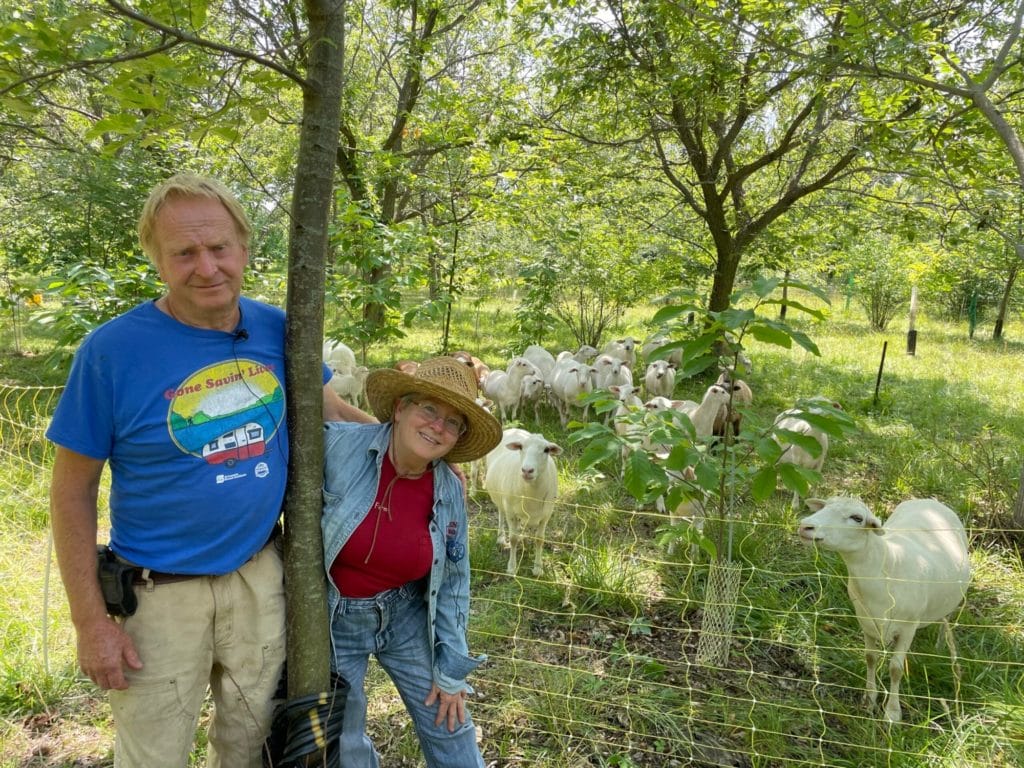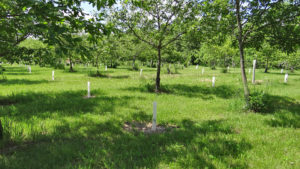A Tool for Preserving Farms
Conservation easements can protect land while making it more affordable for the next generation.
Iowa’s cropland value is some of the highest in the nation – and the top-ranking state in the Midwest, according to the U.S. Department of Agriculture’s National Agricultural Statistics Service. In practical terms, this means farmland in Iowa is expensive. For anyone who wants to start farming or grow their farm business, buying land is a daunting, if not impossible, prospect.
But there are ways retiring farmers and landowners can bring down the cost of land while protecting it for future generations. One option is a conservation easement, a voluntary legal agreement that permanently limits how the land is used. In this overview, learn what an easement is and how it can keep land more affordable for the next generation.
What’s an Easement?

PFI members Tom Wahl and Kathy Dice worked with the Sustainable Iowa Land Trust to place a conservation easement on their family farm in 2020, permanently protecting their 86 acres for perennial agriculture. Tom and Kathy run Red Fern Farm, a you-pick operation where visitors make an appointment to harvest many perennials, including chestnuts, heartnuts, hazelnuts and pawpaws. They also raise Katahdin hair sheep to maintain their groves.
A conservation easement is a legal document that permanently protects land. It attaches to the property deed, meaning whoever buys the land will have to adhere to the protections placed on it. Easements are held by a land trust. Most land trusts are nonprofit organizations, though some are governmental or other third-party entities. These organizations help write the easement and ensure the land is protected in perpetuity according to the terms of the easement.
How Does an Easement Affect Future Owners?
Easement protections will vary depending on what the landowner chooses. They can restrict subdevelopment near cities. Or they can protect natural areas on a property, like timber, wetlands or prairie, while still permitting farming practices in existing fields. Easements can also preserve pasture for grazing, prevent land from being tilled or even require food production on the land. In most cases, these easements will still allow the new farm owners to build new structures like a barn or a second home.
How Do Easements Make Land More Affordable?
The easement removes the development potential for the property, ensuring that the land can only be sold for its agricultural value. This can reduce the future resale price of the property and make the land more affordable for future farmers.
For example: A farm near a town has woods and pasture that could be turned into crop ground. That section of land is valued at $15,000 per acre based on the value of a potential timber sale and subdivision. The land is protected with an easement, restricting subdevelopment and felling of trees. Now those acres will be valued at $10,000 per acre.
How Does This Benefit the Retiring Farmers?
Putting an easement in place does come with legal and organizational fees. But the financial benefits can outweigh those costs. The difference in the land’s value after an easement is established is called “the value of the easement.”
In the scenario above, the value of the easement would be $5,000 per acre. That amount – the value of the easement – is considered a donation. Come tax season, the retiring farmer or landowner can claim an income tax credit for that donation on state and federal taxes. In Iowa, that state credit is 50% of the value of the easement up to $100,000, spread out over 20 years. Federal tax credits don’t have a cap on the 50%. (If you don’t live in Iowa, check your state’s tax laws for tax credits offered in your state.) Additionally, the Natural Resources Conservation Service has incentives that can also benefit farmers and landowners.
If you’re a landowner wishing to sell your land, an easement can help reduce the price of land for the next generation while providing ways to support you in retirement. But putting land in an easement doesn’t require a sale. You may choose to put an easement on your land without selling it. In that case, you’d continue to own the land and retain the ability to lease, sell or bequeath it.
Land Trusts Working in Iowa
Iowa has several land trusts operating in the state. Some have slightly different priorities – but each will work with the owner to come up with an easement that works for that farm. The following are a few that have worked with PFI.
American Farmland Trust seeks to protect agricultural land, keep farmers on the land and promote environmentally sound farming practices.
Iowa Natural Heritage Foundation and The Nature Conservancy are land trusts that focus on conserving natural resources and protecting wild areas while letting existing fields or pasture continue to be farmed. Sustainable Iowa Land Trust works similarly, while focusing on setting aside land for sustainable food production. Most recently, Whiterock Conservancy has created an innovative easement that protects soil health.
“These easements provide landowners with a powerful tool to protect their land for future generations while maintaining its agricultural use,” says Breanna Horsey, executive director of SILT. “By working together, we can ensure that Iowa’s rich farming heritage continues to thrive, benefiting our communities, economy and environment.”
For a comprehensive list of land trusts in Iowa and in other states, you can visit the Land Trust Alliance at landtrustalliance.org/land-trusts.
If you don’t live in Iowa, the Land Trust Alliance lets you search for land trusts in your area.
Contacts for Iowa land trusts whose conservation priorities include farmland
American Farmland Trust
farmland.org
Allison Volk
avolk@farmland.org
Iowa Natural Heritage Foundation
inhf.org
Erin Van Waus
evanwaus@inhf.org
The Nature Conservancy
nature.org/iowa
Amy Crouch
acrouch@TNC.org
Sustainable Iowa Land Trust
silt.org
Jada Fife
fcassistant@silt.org
Whiterock Conservancy
(serving Guthrie County
and surrounding areas)
whiterockconservancy.org
Kate Compton
executivedirector@
whiterockconservancy.org
Learn More about the NRCS – Agricultural Conservation Easement Program
nrcs.usda.gov/programs-initiatives/acep-agricultural-conservation-easement-program
Tax Incentives in Iowa
iowalandoptions.org/tax-benefits
